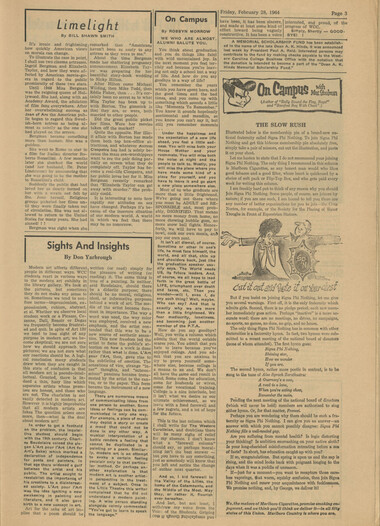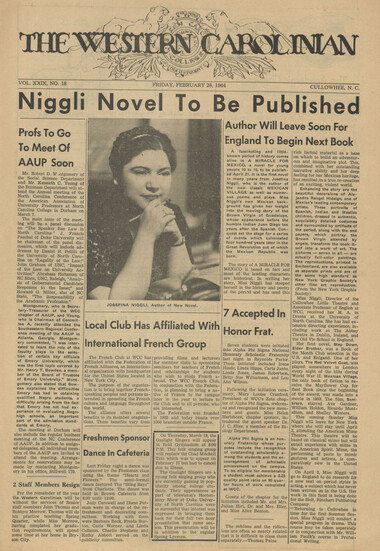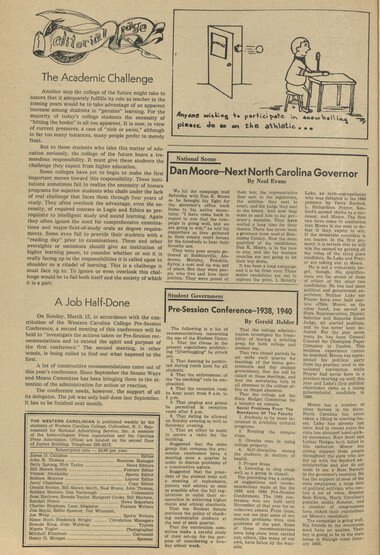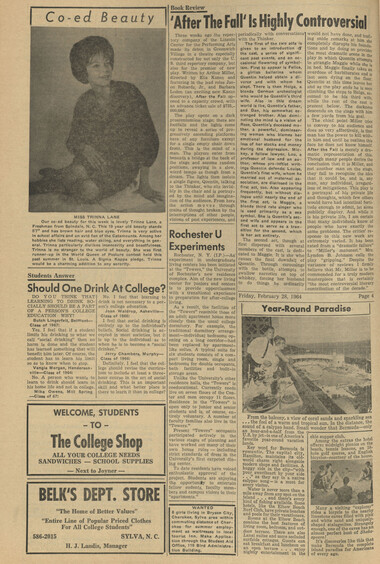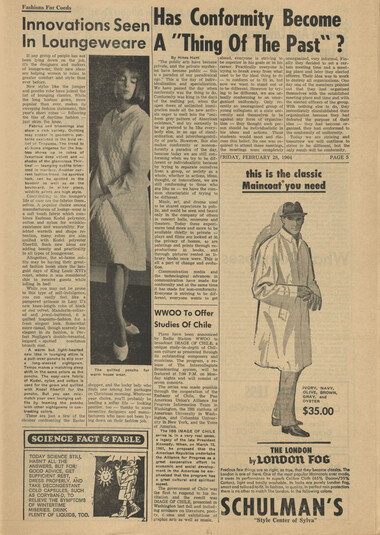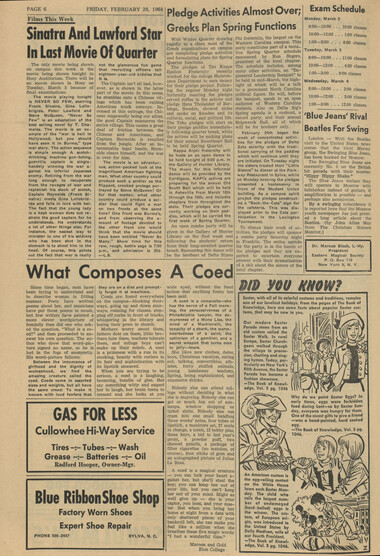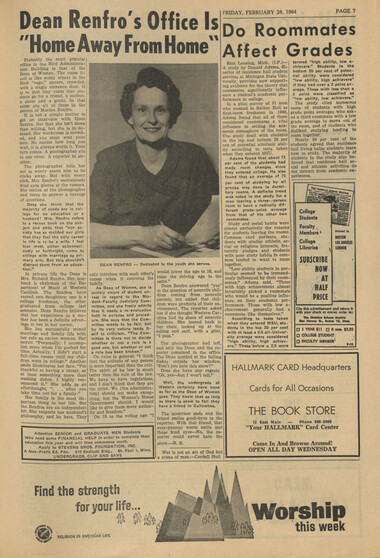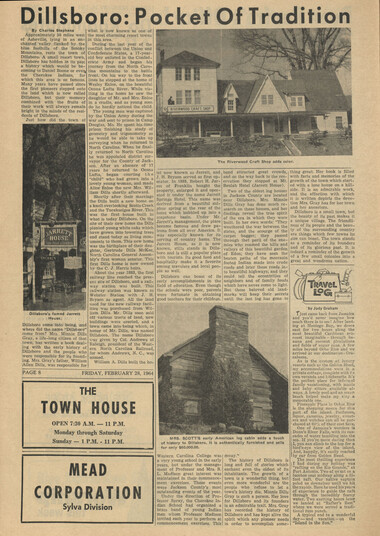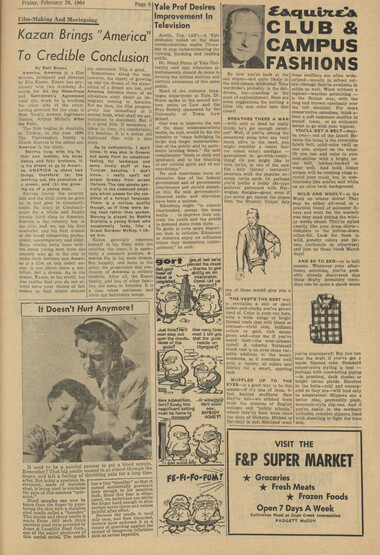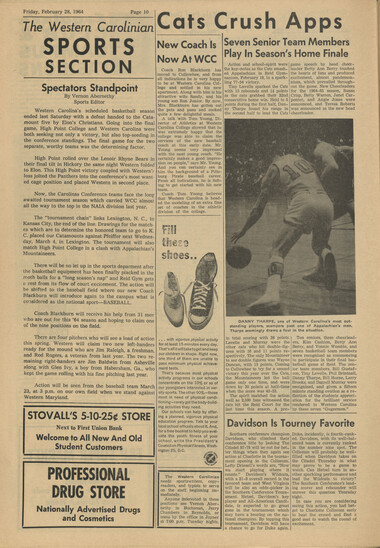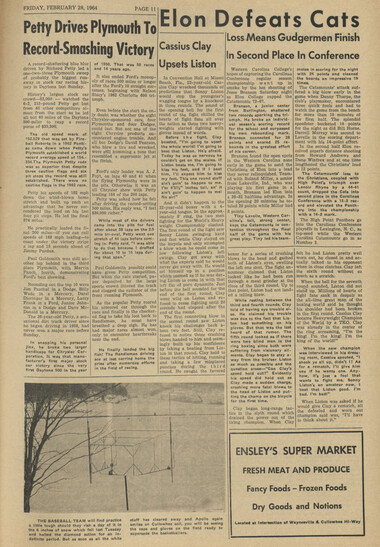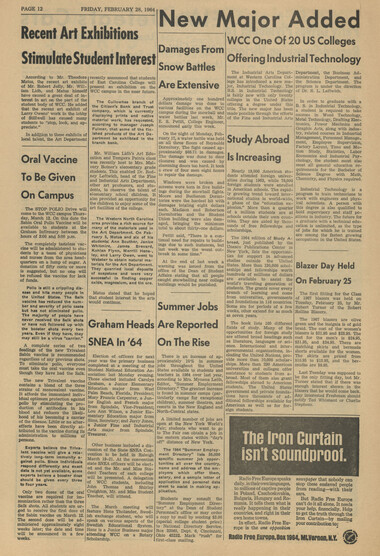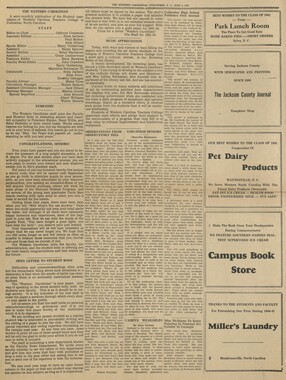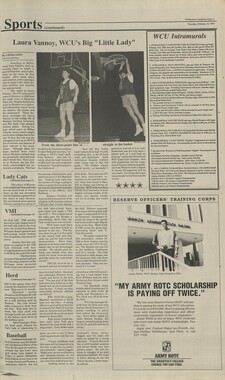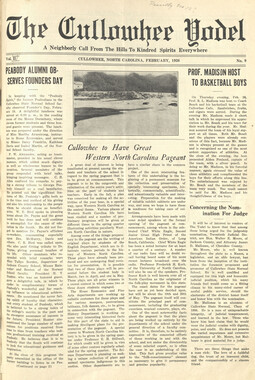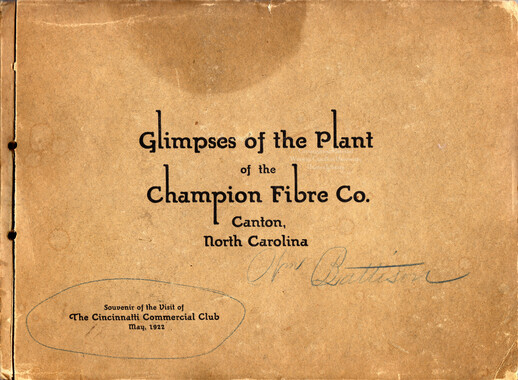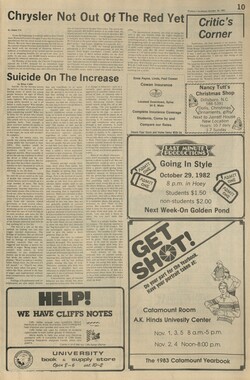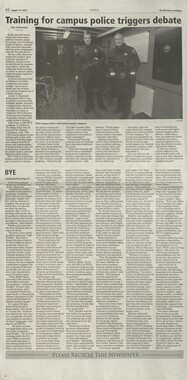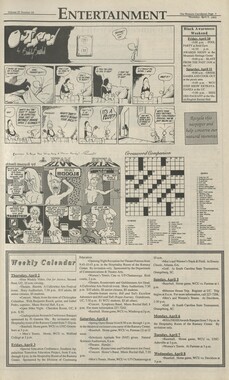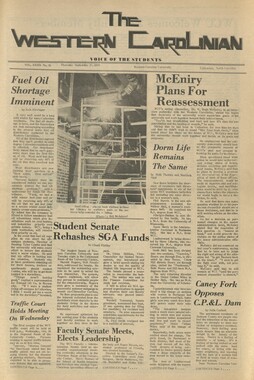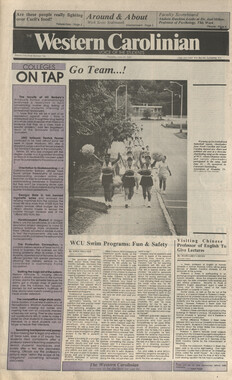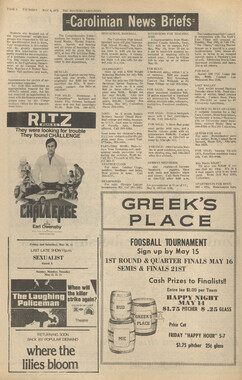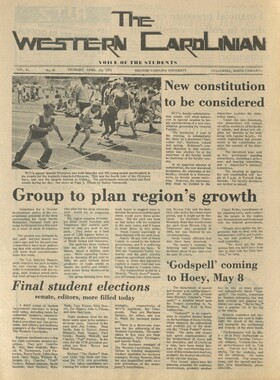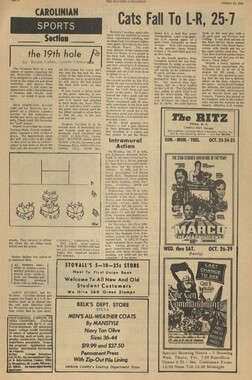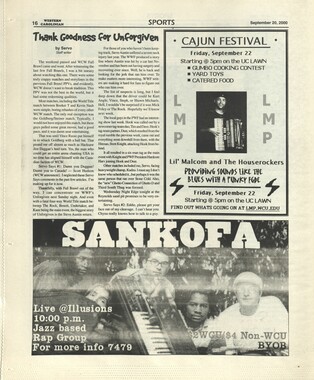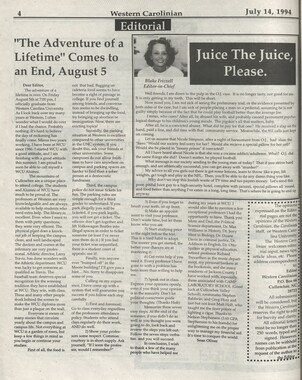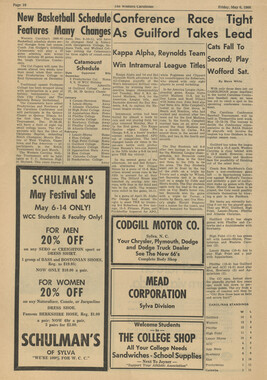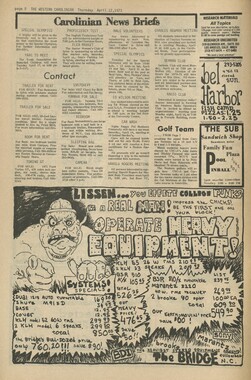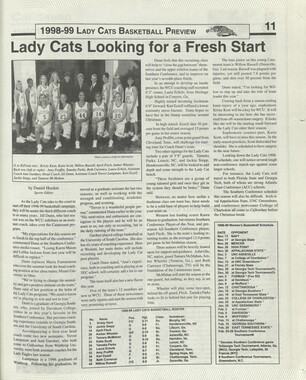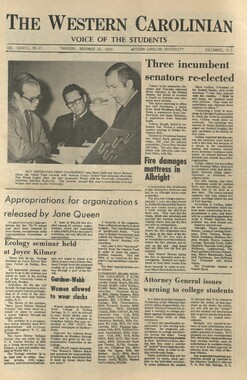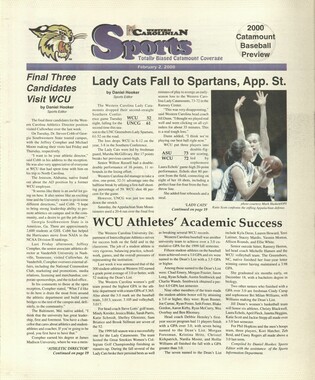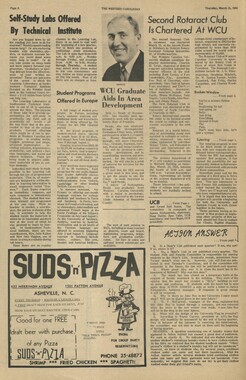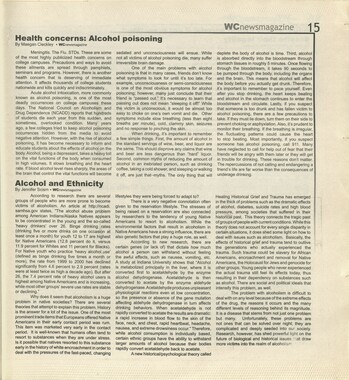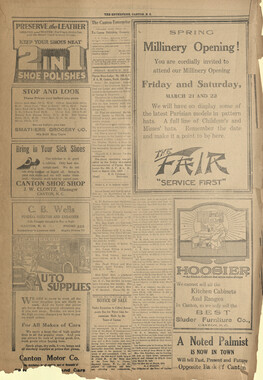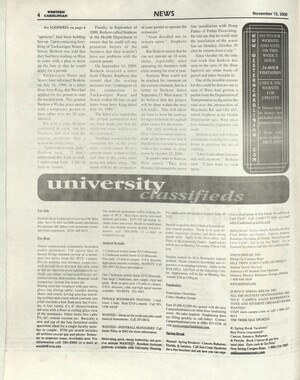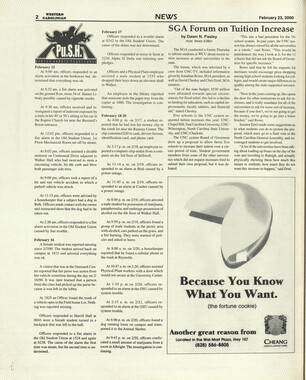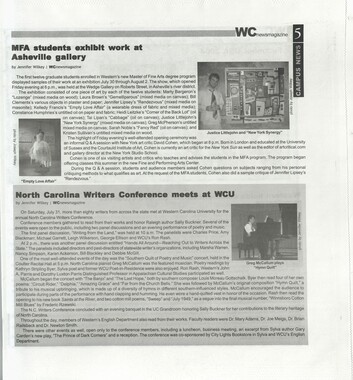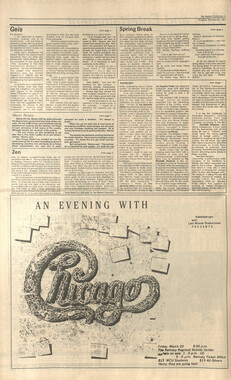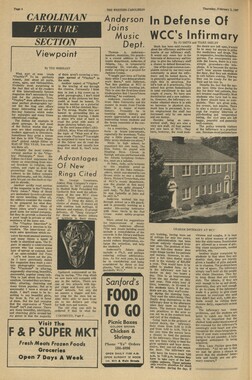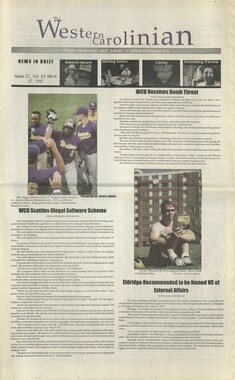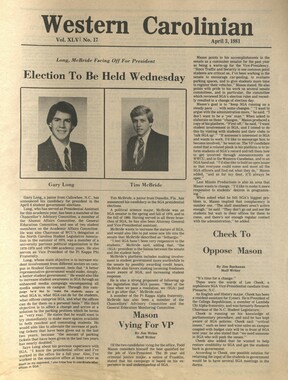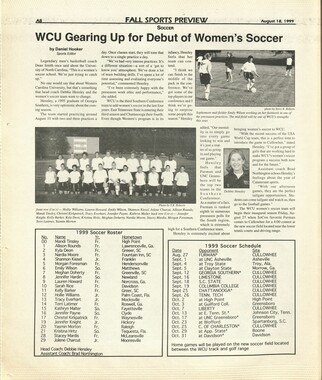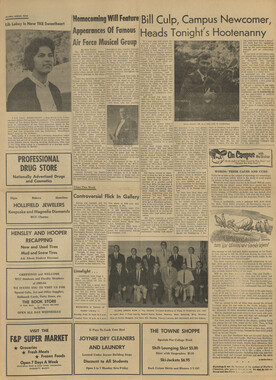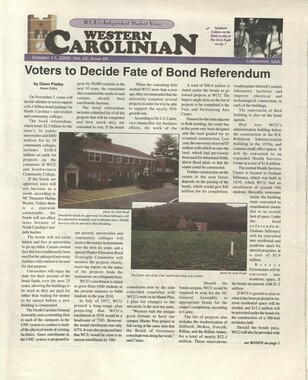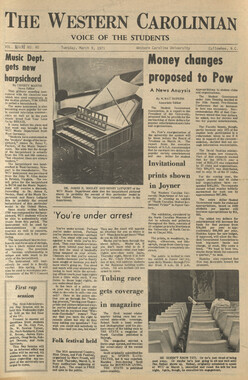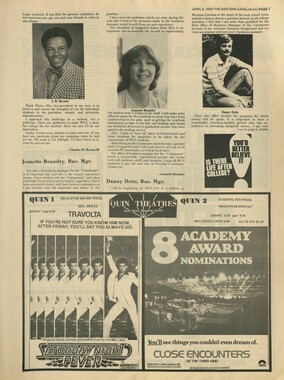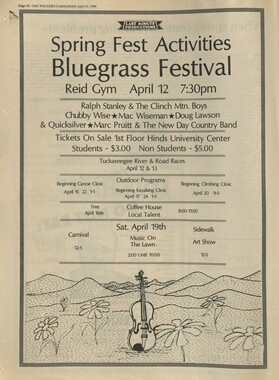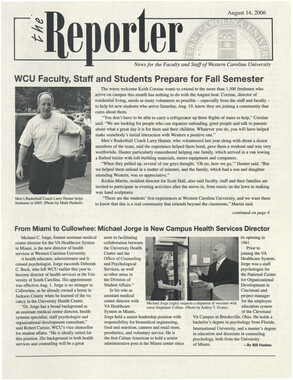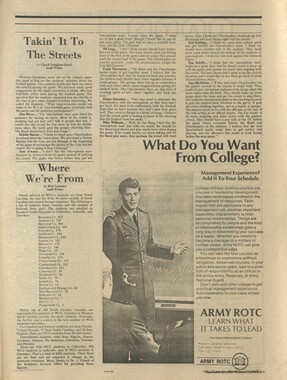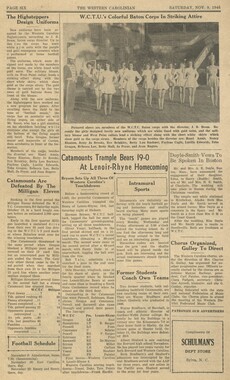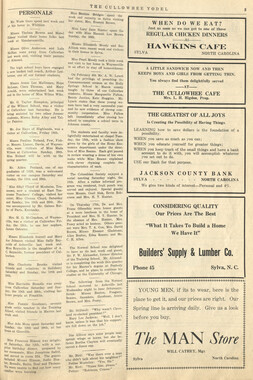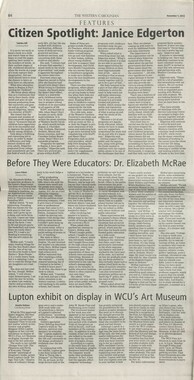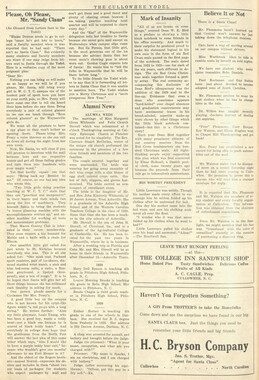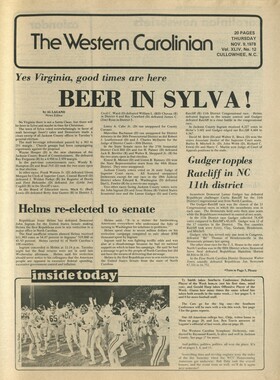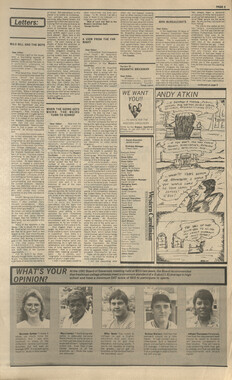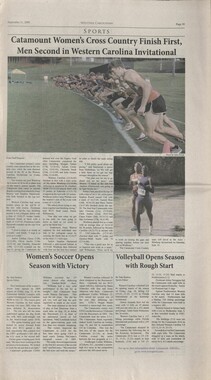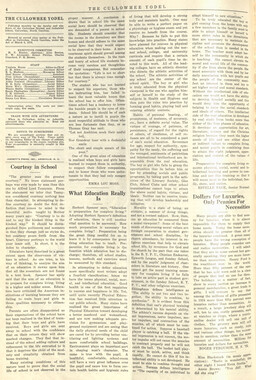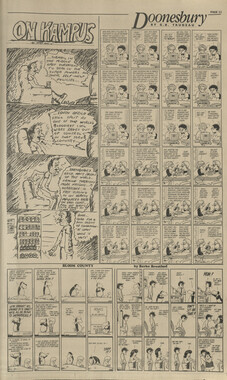Western Carolina University (20)
View all
- Canton Champion Fibre Company (2308)
- Cherokee Traditions (291)
- Civil War in Southern Appalachia (165)
- Craft Revival (1942)
- Great Smoky Mountains - A Park for America (2946)
- Highlights from Western Carolina University (430)
- Horace Kephart (941)
- Journeys Through Jackson (159)
- LGBTQIA+ Archive of Jackson County (85)
- Oral Histories of Western North Carolina (314)
- Picturing Appalachia (6873)
- Stories of Mountain Folk (413)
- Travel Western North Carolina (160)
- Western Carolina University Fine Art Museum Vitreograph Collection (129)
- Western Carolina University Herbarium (92)
- Western Carolina University: Making Memories (738)
- Western Carolina University Publications (2491)
- Western Carolina University Restricted Electronic Theses and Dissertations (146)
- Western North Carolina Regional Maps (71)
- World War II in Southern Appalachia (131)
University of North Carolina Asheville (6)
View all
- Allanstand Cottage Industries (62)
- Appalachian National Park Association (53)
- Bennett, Kelly, 1890-1974 (1463)
- Berry, Walter (76)
- Brasstown Carvers (40)
- Carver, George Washington, 1864?-1943 (26)
- Cathey, Joseph, 1803-1874 (1)
- Champion Fibre Company (233)
- Champion Paper and Fibre Company (297)
- Cherokee Indian Fair Association (16)
- Cherokee Language Program (22)
- Crowe, Amanda (40)
- Edmonston, Thomas Benton, 1842-1907 (7)
- Ensley, A. L. (Abraham Lincoln), 1865-1948 (275)
- Fromer, Irving Rhodes, 1913-1994 (70)
- George Butz (BFS 1907) (46)
- Goodrich, Frances Louisa (120)
- Grant, George Alexander, 1891-1964 (96)
- Heard, Marian Gladys (60)
- Kephart, Calvin, 1883-1969 (15)
- Kephart, Horace, 1862-1931 (313)
- Kephart, Laura, 1862-1954 (39)
- Laney, Gideon Thomas, 1889-1976 (439)
- Masa, George, 1881-1933 (61)
- McElhinney, William Julian, 1896-1953 (44)
- Niggli, Josephina, 1910-1983 (10)
- North Carolina Park Commission (105)
- Osborne, Kezia Stradley (9)
- Owens, Samuel Robert, 1918-1995 (11)
- Penland Weavers and Potters (36)
- Roberts, Vivienne (15)
- Roth, Albert, 1890-1974 (142)
- Schenck, Carl Alwin, 1868-1955 (1)
- Sherrill's Photography Studio (2565)
- Southern Highland Handicraft Guild (127)
- Southern Highlanders, Inc. (71)
- Stalcup, Jesse Bryson (46)
- Stearns, I. K. (213)
- Thompson, James Edward, 1880-1976 (226)
- United States. Indian Arts and Crafts Board (130)
- USFS (683)
- Vance, Zebulon Baird, 1830-1894 (1)
- Weaver, Zebulon, 1872-1948 (58)
- Western Carolina College (230)
- Western Carolina Teachers College (282)
- Western Carolina University (2008)
- Western Carolina University. Mountain Heritage Center (18)
- Whitman, Walt, 1819-1892 (10)
- Wilburn, Hiram Coleman, 1880-1967 (73)
- Williams, Isadora (3)
- Cain, Doreyl Ammons (0)
- Crittenden, Lorraine (0)
- Rhodes, Judy (0)
- Smith, Edward Clark (0)
- Appalachian Region, Southern (2569)
- Asheville (N.C.) (1923)
- Avery County (N.C.) (26)
- Blount County (Tenn.) (195)
- Buncombe County (N.C.) (1672)
- Cherokee County (N.C.) (283)
- Clay County (N.C.) (555)
- Graham County (N.C.) (236)
- Great Smoky Mountains National Park (N.C. and Tenn.) (519)
- Haywood County (N.C.) (3569)
- Henderson County (N.C.) (70)
- Jackson County (N.C.) (4912)
- Knox County (Tenn.) (35)
- Knoxville (Tenn.) (13)
- Lake Santeetlah (N.C.) (10)
- Macon County (N.C.) (420)
- Madison County (N.C.) (215)
- McDowell County (N.C.) (39)
- Mitchell County (N.C.) (132)
- Polk County (N.C.) (35)
- Qualla Boundary (982)
- Rutherford County (N.C.) (76)
- Swain County (N.C.) (2182)
- Transylvania County (N.C.) (270)
- Watauga County (N.C.) (12)
- Waynesville (N.C.) (86)
- Yancey County (N.C.) (72)
- Aerial Photographs (3)
- Aerial Views (60)
- Albums (books) (4)
- Articles (1)
- Artifacts (object Genre) (228)
- Bibliographies (1)
- Biography (general Genre) (2)
- Cards (information Artifacts) (38)
- Clippings (information Artifacts) (191)
- Copybooks (instructional Materials) (3)
- Crafts (art Genres) (622)
- Depictions (visual Works) (21)
- Design Drawings (1)
- Drawings (visual Works) (185)
- Envelopes (73)
- Exhibitions (events) (1)
- Facsimiles (reproductions) (1)
- Fiction (general Genre) (4)
- Financial Records (12)
- Fliers (printed Matter) (67)
- Glass Plate Negatives (381)
- Guidebooks (2)
- Internegatives (10)
- Interviews (815)
- Land Surveys (102)
- Letters (correspondence) (1013)
- Manuscripts (documents) (618)
- Maps (documents) (177)
- Memorandums (25)
- Minutes (administrative Records) (59)
- Negatives (photographs) (6090)
- Newsletters (1290)
- Newspapers (2)
- Notebooks (8)
- Occupation Currency (1)
- Paintings (visual Works) (1)
- Pen And Ink Drawings (1)
- Periodicals (193)
- Personal Narratives (10)
- Photographs (12976)
- Plans (maps) (1)
- Poetry (5)
- Portraits (4568)
- Postcards (329)
- Programs (documents) (181)
- Publications (documents) (2443)
- Questionnaires (65)
- Relief Prints (26)
- Sayings (literary Genre) (1)
- Scrapbooks (282)
- Sheet Music (2)
- Slides (photographs) (402)
- Songs (musical Compositions) (2)
- Sound Recordings (796)
- Specimens (92)
- Speeches (documents) (18)
- Tintypes (photographs) (8)
- Transcripts (322)
- Video Recordings (physical Artifacts) (23)
- Text Messages (0)
- A.L. Ensley Collection (275)
- Appalachian Industrial School Records (7)
- Appalachian National Park Association Records (336)
- Axley-Meroney Collection (2)
- Bayard Wootten Photograph Collection (20)
- Bethel Rural Community Organization Collection (7)
- Blumer Collection (5)
- C.W. Slagle Collection (20)
- Canton Area Historical Museum (2110)
- Carlos C. Campbell Collection (462)
- Cataloochee History Project (64)
- Cherokee Studies Collection (4)
- Daisy Dame Photograph Album (5)
- Daniel Boone VI Collection (1)
- Doris Ulmann Photograph Collection (112)
- Elizabeth H. Lasley Collection (1)
- Elizabeth Woolworth Szold Fleharty Collection (4)
- Frank Fry Collection (95)
- George Masa Collection (173)
- Gideon Laney Collection (452)
- Hazel Scarborough Collection (2)
- Hiram C. Wilburn Papers (28)
- Historic Photographs Collection (236)
- Horace Kephart Collection (861)
- Humbard Collection (33)
- Hunter and Weaver Families Collection (1)
- I. D. Blumenthal Collection (4)
- Isadora Williams Collection (4)
- Jesse Bryson Stalcup Collection (47)
- Jim Thompson Collection (224)
- John B. Battle Collection (7)
- John C. Campbell Folk School Records (80)
- John Parris Collection (6)
- Judaculla Rock project (2)
- Kelly Bennett Collection (1482)
- Love Family Papers (11)
- Major Wiley Parris Civil War Letters (3)
- Map Collection (12)
- McFee-Misemer Civil War Letters (34)
- Mountain Heritage Center Collection (4)
- Norburn - Robertson - Thomson Families Collection (44)
- Pauline Hood Collection (7)
- Pre-Guild Collection (2)
- Qualla Arts and Crafts Mutual Collection (12)
- R.A. Romanes Collection (681)
- Rosser H. Taylor Collection (1)
- Samuel Robert Owens Collection (94)
- Sara Madison Collection (144)
- Sherrill Studio Photo Collection (2558)
- Smoky Mountains Hiking Club Collection (616)
- Stories of Mountain Folk - Radio Programs (374)
- The Reporter, Western Carolina University (510)
- Venoy and Elizabeth Reed Collection (16)
- WCU Gender and Sexuality Oral History Project (32)
- WCU Mountain Heritage Center Oral Histories (25)
- WCU Oral History Collection - Mountain People, Mountain Lives (71)
- WCU Students Newspapers Collection (1923)
- Western North Carolina Tomorrow Black Oral History Project (69)
- William Williams Stringfield Collection (2)
- Zebulon Weaver Collection (109)
- African Americans (390)
- Appalachian Trail (35)
- Artisans (521)
- Cherokee art (84)
- Cherokee artists -- North Carolina (10)
- Cherokee language (21)
- Cherokee pottery (101)
- Cherokee women (208)
- Church buildings (189)
- Civilian Conservation Corps (U.S.) (111)
- College student newspapers and periodicals (2012)
- Dams (107)
- Dance (1023)
- Education (222)
- Floods (61)
- Folk music (1015)
- Forced removal, 1813-1903 (2)
- Forest conservation (220)
- Forests and forestry (1184)
- Gender nonconformity (4)
- Great Smoky Mountains National Park (N.C. and Tenn.) (181)
- Hunting (45)
- Landscape photography (25)
- Logging (119)
- Maps (83)
- Mines and mineral resources (8)
- North Carolina -- Maps (18)
- Paper industry (38)
- Postcards (255)
- Pottery (135)
- Railroad trains (72)
- Rural electrification -- North Carolina, Western (3)
- School integration -- Southern States (2)
- Segregation -- North Carolina, Western (5)
- Slavery (5)
- Sports (452)
- Storytelling (243)
- Waterfalls -- Great Smoky Mountains (N.C. and Tenn.) (66)
- Weaving -- Appalachian Region, Southern (280)
- Wood-carving -- Appalachian Region, Southern (328)
- World War, 1939-1945 (173)
Western Carolinian Volume 29 Number 18
Item
Item’s are ‘child’ level descriptions to ‘parent’ objects, (e.g. one page of a whole book).
-
-
Limelight By BILL SHAWN SMITH It's ironic and frightening how quickly American views on morals can change. To illustrate the case in point, I shall use two cinema actresses, Ingrid Bergman and Elizabeth Taylor, and how they were affected by American movie-goers in regard to the public promiscuity of these two stars. Until 1949 Miss Bergman was the reigning queen of Hollywood. She had, along with an Academy Award, the adulation of film fans everywhere. After her overwhelming success as Joan o'f Arc the American public began to regard this Swedish-born actress as being almost as saintly as the one she had played on the screen. Bergman became something more than human. She was a goddess. She went to Rome to star in a film for Italian director Roberto Rossellini. A few months later she shocked the world (and her husband, Dr. Peter Lindstrom) by announcing that she was going to be the mother to Rossellini's child. Suddenly the public that had loved her so dearly turned on her with a wrath not felt by Ste. Joan herself. Religious groups picketed her films until they were finally taken out of circulation. She was not allowed to return to the United States for many years. She had sinned! ! ! Bergman was right when she remarked that "Americans haven't been as nasty to any actress as they were to me." About the time Bergman made her shattering pregnancy announcement Elizabeth Taylor was preparing for her beautiful story-book wedding to Nicky Hilton. After Hilton came Michael Wilding, then Mike Todd, then Eddie Fisher, then . . . It's certainly been no secret as to what Miss Taylor has been up to with Burton. The gimmick is that they are, or were, both married to other people. Did the great public picket her films. Were her movies taken off the market? Quite the opposite. Her illicit affair with Burton has made them both top box-office attractions, and whatever success Cleopatra has had is solely because the mass sex-worshippers want to see the pair doing par tially on screen what they do completely off. Taylor has become a real-life Cleopatra, and her public loves her for it. Miss Bergman recently remarked that "Elizabeth Taylor can get away with murder." She prob ably could. It is interesting to note how rapidly our attitudes on sex have changed. Perhaps it's be cause of the insecure situation of our modern world. A world in which we feel that there may be no tomorrow. Sights And Insights By Don Yarbrough Modern art affects different people in different ways. WCC students react in various ways to the modern art exhibits in the library gallery. We look at the pictures, but sometimes they do not make any sense to us. Sometimes we tend to confuse terms—impressionism, expressionism, cubism, abstract, et al. Whether we observe local student work or a Picasso, Cezanne, Dali, Renoir or Degas we frequently become frustrated and quit. In spite of Art 130 we tend to lose sight of any purpose in modern art; we become skeptical; we are not sure how we should approach the pictures; we are not sure what our reactions should be. A logical conclusion many students draw when they are caught in this state of confusion is that all modern art is pseudo-intel lectual. Granted, there is in deed a thin, hazy line which separates artists whose premises are honest, and those who are not. The charlatan is not easily detected in modern art. However it is highly improbable that all modern artists are fakes The question arises once more, then—what is the deal about modern art? In order to get a foothold on the problem, the inquisitive student should begin with the 19th century. Charles Baudelaire coined the slogan L'Art pour I'Art (Art for Art's Sake) which marked a declaration of independence for poets and painters. In that age there widened a gulf between the artist and his public. The artist sought to reestablish the importance, of his creations to a disinterested society. L'Art pour I'Art was the idea igniting a new awakening in painting and literature, and it also gave birth to a new concept in art. Art for the sake of art implies that a poem should be written (or read) simply for the pleasure of writing (or reading) it. The same thing is true of a painting. In neither, said Baudelaire, should there be a didactic purpose; there should be no moral, religious, ideal, or informative purposes behind a work of art. The media of the artist became foremost in importance. The way a word was used, the way color was employed, received a new emphasis, and the artist contended that this was to be a new source of aesthetic sensation. This new freedom led the artist to focus the public's attention on how a work is done rather than what is done. L'Art pour I'Art, then, gave rise to the subtleties of emotion. The sensations of vice, strange "inner" thoughts, and "subconscious" passions became transmuted by the artist to the canvas, or to the paper. This form became the instrument of a new language. There are numerous means of communicating Ideas from one person to another. Some ideas or feelings can be communicated in only one way. For example, a piece of music may depict a story or create a mood that could not be done in any other way. A musical interpretation of a battle renders a feeling that cannot be duplicated in a painting or a poem. Similarly, modern art is an attempt to evoke a certain feeling peculair only to that particular method. Or perhaps another explanation is that modern art is another artistic perspective in the treatment of a subject. Once in the Little Theatre this writer complained that he did not understand a modern painting. A wise person standing alongside calmly commented: "You've got to learn to speak the language." On Campus By ROBBYN MORROW WE WHO ARE ALMOST ALUMNI SALUTE YOU. You think about graduation and you do things like faint with wild uncontained joy. In the next moment you feel terribly sad because you're leaving not only a school but a way of life. And how do you say goodbye to a way of life? You remember the years which you have spent here, and the good times and the bad times, and you come up with something which sounds a little like "Moments To Remember." You know it sounds hopelessly sentimental and maudlin, so you know you can't say it, but still you remember moments Under the happiness and the expectation of a new life ahead, you feel a little sadness. You will miss both your House Mother and your roommate. You will miss both the noise at night and the people to talk to. Mostly, you will miss the place where you have made some kind of a place for yourself, and you have to leave it and go start a new place somewhere else. Most of us who graduate are more than a little frightened. We're going out there where you must be ADULT and RESPONSIBLE and, most probably, DIGNIFIED. That means no more money from home, no more chewing bubble gum, no more snow ball fights. Hence forth, we will have to pay to bowl, cook our own meals, an6> pay our own rent. It isn't all dismal, of course. Sometime or other in one's life, he must face himself, the world, and all that, chin up and shoulders back, Just like the graduation speaker usually says. The World needs US, its future leaders. And, of course, we all hope to lead forth in the great battle of LIFE, triumphant over death and taxes, etc. Then you wonder—will I, even I, do any such thing? Well, maybe. Who can say? And that is exactly why we are more than a little frightened. We fear mediocrity, loneliness, and becoming just another member of the P.T.A. How do you say goodbye? Well, you write a column which admits that the world outside scares you. You admit that you hate to leave because you've enjoyed college. And you admit that you are anxious to try to prove yourself somewhere else, because college is a means to an end. We don't all have the same end result in mind. Some come for education, some for husbands or wives, some for vocational training. College is a nice interlude, but it isn't what we desire as our ultimate achievement, so we leave with a fond farewell and a few regrets, and a lot of hope for the future. This is the last column which I shall write for The Western Carolinian, and doubtless there will be many sighs of relief for my absence. I don't know what a "farewell column" should say, so perhaps moralizing isn't the best answer — but you have to say something, just so somebody will know that you left and notice the change of author next quarter. And so, I bid farewell to the Valley of the Lilies, the home of the Catamounts, and the Middle of the Most. May they, or rather it, flourish ever hereafter. And last, but not least, 1 withdraw my voice from the Voic of the Students. Griping vein }{ ugnoqj gutujerduioo pue Friday, February 28, 1964 Page 3 have been, it has been sincere, and made at least some kind of effort toward being vaguely constructive. It has been a voice interested, and proud, of the progress of WCC. Simply, Shortly — GOOD- BYEI 1 A MEMORIAL SCHOLARSHIP FUND has been established in the name of the late Dean A. K. Hinds, it was announced last week by President Paul A. Reid. Interested persons may contribute to the fund by making checks payable to the Western Carolina College Business Office with the notation that the donation is intended to become a part of the "Dean A. K. Hinds Memorial Scholarship Fund." On Campus with M&QhuIman (Author of "Rally Round the Flag, Boys!" and ''Barefoot Boy With Ch, THE SLOW RUSH Illustrated below is the membership pin of a brand-new national fraternity called Signa Phi Nothing. To join Signa Phi Nothing and get this hideous membership pin absolutely free, simply take a pail of scissors, cut out the illustration, and paste it on your chest. Let me hasten to state that I do not recommend your joining Signa Phi Nothing. The only thing I recommend in this column is Marlboro Cigarettes, as any honest man would who likea good tobacco and a good filter, whose heart is quickened by a choice of soft pack or Flip-Top Box, and who gets paid every Week for writing this column. I am frankly hard put to think of any reason why you should Join Signa Thi Nothing. Some people, of course, are joiners by nature; if you are one such, I am bound to tell you tin any number of better organizations for you to join Nostra, for example, or the Society for the Placing of Water Troughs in Front of Equestrian Statues, duModffld^td ii otiour^csi But if you insist on joining Signa Phi Nothing, let me give you several warnings. First off, it is the only fraternity which admits girls. Second, there is no pledge period; each new member immediately goes active. Perhaps "inactive" is a more accurate word: there are no meetings, no drives, no campaigns, no sports, no games, no dues, no grip, and no house. The only thing Signa Phi Nothing has in common with other fraternities is a fraternity hymn. In fact, two hymns were submitted to a recent meeting of the national board of directors (none of whom attended). The first hymn goes; Signa Phi Nothing, Shining star, How we wonder If you are. The second hymn, rather more poetic in content, is to be Bung to the tune of Also Sprach Zaralhuslra: A Guernsey's a cow, A road is a lane, When you're eating chow, Remember the mein. Pending the next meeting of the national board of directors (which will never be held) members are authorized to sing either hymn. Or, for that matter, Frenesi. Perhaps you are wondering why there should be such a fraternity as Signa Phi Nothing. I can give you an answer—an answer with which you cannot possibly disagree: Signa Phi Nothing fills a weU^needed gap. Are you suffering from mental health? Is logic distorting your thinking? Is ambition encroaching on your native sloth? Is your long-cherished misinformation retreating before a sea of facts? In short, has education caught up with you? If so, congratulations. But spring is upon us and the sap is rising, and the mind looks back with poignant longing to the days when it was a puddle of unreason. If—just for a moment—you want to recapture those careless vaporings, tfrat warm, squishy confusion, then join Signa Phi Nothing and renew your acquaintance with fecklessness. We promise nothing, and, by George, we deliver it! We, the makers of Marlboro Cigarettes, promise smoking en» Joyment, and ice think you'll think we deliver it—in all fifty etates of this Union. Marlboro Country ie where you are.
Object
Object’s are ‘parent’ level descriptions to ‘children’ items, (e.g. a book with pages).
-
The Western Carolinian is Western Carolina University’s student-run newspaper. The paper was published as the Cullowhee Yodel from 1924 to 1931 before changing its name to The Western Carolinian in 1933.
-
